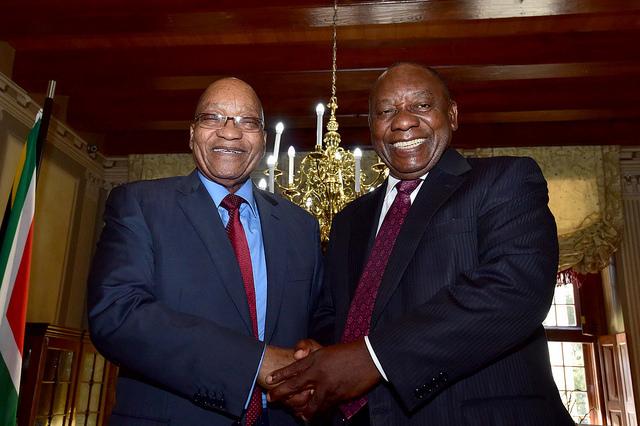South Africa’s enigmatic new leader
Posted By Anthony Butler on March 22, 2018 @ 14:30

Cyril Ramaphosa, the newly elected president of South Africa, likes to describe himself as an enigma. A carefully cultivated aura of mystery surrounds his political beliefs and policy preferences.
Ramaphosa’s life is beset by paradox. He was born in 1952, in a Johannesburg township later demolished as part of apartheid’s forced removals program.
He was a Christian activist as a young man. Detained and held in solitary confinement for long periods in the mid‑1970s, he switched to trade union organisation in the 1980s, forming the giant National Union of Mineworkers, through which he rose to national prominence.
Aligning the burgeoning trade union to the then-exiled African National Congress (ANC), Ramaphosa rose rapidly in the liberation movement after Nelson Mandela’s release from prison in 1990. He led the ANC negotiating team that enabled a transition to constitutional democracy in 1994, before being sidelined by the wily Thabo Mbeki, Mandela’s successor.
He was forced to divert his energies into business. Richer—his fortune is estimated by Forbes to be in excess of US$500 million—and perhaps wiser, unionist-turned-tycoon Ramaphosa returned to political prominence in 2012, when he was unexpectedly elected by the ANC as Jacob Zuma’s deputy.
Ramaphosa used this platform to build a leadership campaign that ultimately took him to the ANC presidency in December 2017, and to South Africa’s presidency a few weeks later. This was a bitter and dirty campaign, and Ramaphosa demonstrated a ruthlessness that silenced many of his former critics.
However, even those close to the new president remain unsure as to which Ramaphosa will lead South Africa at a time of economic stagnation and political uncertainty. Will it be the moralist, the champion of the workers or the man of commerce?
His closest political ally, ANC chair and now mineral resources minister Gwede Mantashe, is a fellow trade unionist and a prominent former leader of the SA Communist Party. But Cyril’s friends—he is universally known by his first name—also include many prominent business people.
A long period chairing mobile phone giant MTN while it secured market access across Africa left Ramaphosa deeply informed about the priorities of big business on the continent. He has extensive international networks, forged through the former Commonwealth Business Council, international business advisory boards, Standard Bank and UN commissions.
As former head of the National Planning Commission, he has a grasp of the key long-range policy challenges confronting the government he now leads.
His immediate priorities include urgent damage limitation exercises in the economy, most evidently in containing the systemic risks that state-owned energy company Eskom poses to the country’s energy security and financial stability.
Embroiled in the alleged ‘state capture’ crises of the Zuma era, the parastatal (or government–business enterprise) sector as a whole has been left enfeebled and indebted as a result of the systematic diversion of resources to politically connected business groups.
Ramaphosa also must win the national and provincial elections that are due to be held in the first half of 2019. He secured the ANC presidency last year by a very narrow margin, and many of his more grudging supporters favoured him over Zuma’s preferred successor, Dr Nkosazana Dlamini-Zuma, only because of her limited pulling power with voters.
The ANC, after all, has already lost control of key cities, including Johannesburg, Cape Town and Pretoria. Activists fear that next year it might lose control of the largest and most economically important province, Gauteng, and perhaps even its majority in the national parliament.
Ramaphosa has been posing as a friend of the opposition Economic Freedom Fighters, borrowing some of their radical policy proposals concerning land reform, and enticing the party’s firebrand leader, Julius Malema, towards a tentative partnership.
He is also likely to reach out to the official opposition, the Democratic Alliance, by championing an ostensible spirit of national unity.
If Ramaphosa pulls off a big win over these currently outfoxed rivals, as seems likely, his control of the ANC, and of the presidency, will be entrenched. Only then will we see what the cagey pragmatist truly has in mind for his party and for his country.
For the ANC, this is likely to mean an overhaul of rigged membership systems, and an attempt to disentangle the currently close linkages between politics and money in internal elections.
In national government, Ramaphosa will need time to remedy the disastrous misjudgements of the Zuma era. Key institutions such as the national treasury, the revenue service, police and intelligence agencies, and the criminal justice system are likely to be restored to greater effectiveness. Ramaphosa’s touted priorities mostly concern the economy: lower youth unemployment, accelerated black empowerment and faster economic growth lie at the centre of his program.
Like most political leaders, Ramaphosa is likely to develop wider international ambitions the longer he remains in office. He’s an internationalist who played a canny game as a trade union leader, milking donations from communist and Western union federations alike. His approach to foreign affairs is likely to centre on economic diplomacy, and he’s deeply interested in the trajectory of contemporary China. Ideology and history are unlikely to prove obstacles to the creation of new partnerships in the global south.
It remains hard to see how Ramaphosa will tackle the vested interests that inhibit labour market reform, a crisis-ridden school system, and a sclerotic and oligopolistic business community. Indeed, Ramaphosa will have to take on one-time comrades and close business associates alike if he is to assemble significant coalitions for change.
After Ramaphosa’s meteoric and assured rise to the presidency, however, fewer South Africans are today willing to bet against him.
Article printed from The Strategist: https://aspistrategist.ru
URL to article: /south-africas-enigmatic-new-leader/
Click here to print.